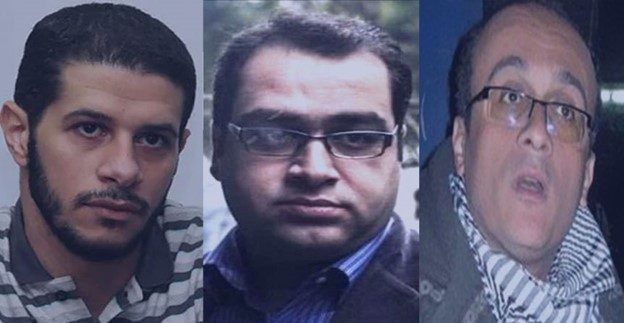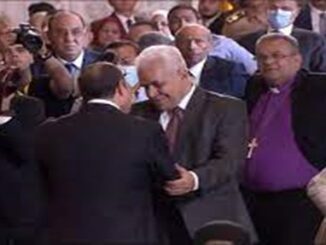
Human rights defenders have rushed to condemn the prison sentence against former parliamentarian Ziad El-Elaimy, journalists Hisham Fouad and Hossam Moanis, and three others,
The Cairo Institute for Human Rights Studies and seven other Egyptian human rights organizations said that this confirms that “the government’s anti-human rights policies will remain in place” despite its “fictitious lifting of the state of emergency” and publishing of an “incomplete human rights strategy.”
The organizations urged General Abdel Fattah al-Sisi not to ratify the “outrageous sentence.” Emergency court rulings are not appealable, but the president has the power to nullify verdicts or order a retrial.
Amnesty International’s Middle East and North Africa Research and Advocacy Director Philip Luther likewise called on the president to “quash the sentences and immediately and unconditionally release all those detained purely for exercising their right to freedom of expression.”
He added, “These politicians and activists should never have been arrested in the first place and yet they have been convicted and sentenced to prison on charges related to their legitimate criticism of the Egyptian authorities.”
POMED Director of Advocacy Seth Binder called the verdict “a devastating decision for those involved in one of the most prominent political cases inside Egypt.” He added that al-Sisi’s regime “clearly does not care about improving human rights, [and international] ‘partners’ must respond knowing that, or I fear we will see similar verdicts for other political prisoners.”
Allison McManus, research director at the Freedom Initiative, said that it is “unconscionable that last week top U.S. officials welcomed Egyptian counterparts and praised [their] strategic partnership and vision for human rights” and asked, “Why should we believe diplomacy is effective behind closed doors when it’s not reflected behind bars?”
On November 17, following a four-month trial marred by numerous due process violations, an emergency court handed lengthy prison sentences to former parliamentarian Ziad el-Elaimy, journalists Hisham Fouad and Hossam Moanis, and three others.
El-Elaimy received a five-year prison sentence, while Fouad and Moanis each received four years. The other three—Hossam Abdel Nasser, Mohammed Bahnasy, and Fatima Ramadan—were all sentenced to three years behind bars, the latter in absentia.
El-Elaimy, Fouad, and Moanis were arrested in June 2019 as part of the Hope Coalition case. In July 2021, after spending more than the legal maximum of two years in pretrial detention, they were referred to trial in a new case copied from the original one. Read more about the bogus charges against them and details from their unfair trial in this previous Egypt Update.
Journalist Sharif Kouddous warned that the nearly two and a half years that the trio already spent in pretrial detention “may not count towards this sentence because they were technically imprisoned in a separate case,” adding that we will “have to see whether the other case is dropped, which would allow their time in prison to count towards this sentence.”
Hussein Baoumi, Egypt and Libya researcher at Amnesty International, added, “A largely ignored aspect of these emergency trials is that prosecutors chose to refer defendants to trial over cases different from the ones they have been detained over, opening the door for indefinite detention should the authorities decide so.”
Activist Alaa Abdel Fattah, lawyer Mohamed El-Baqer, and blogger Mohamed “Oxygen” Ibrahim, who are expecting a verdict from their own trial before an emergency court next month, are facing a similar situation.
Researcher Patrick George Zaki and Strong Egypt Party President Abdel Moneim Aboul-Fotouh are also currently facing trials in emergency courts despite the state of emergency finally coming to an end last month.



